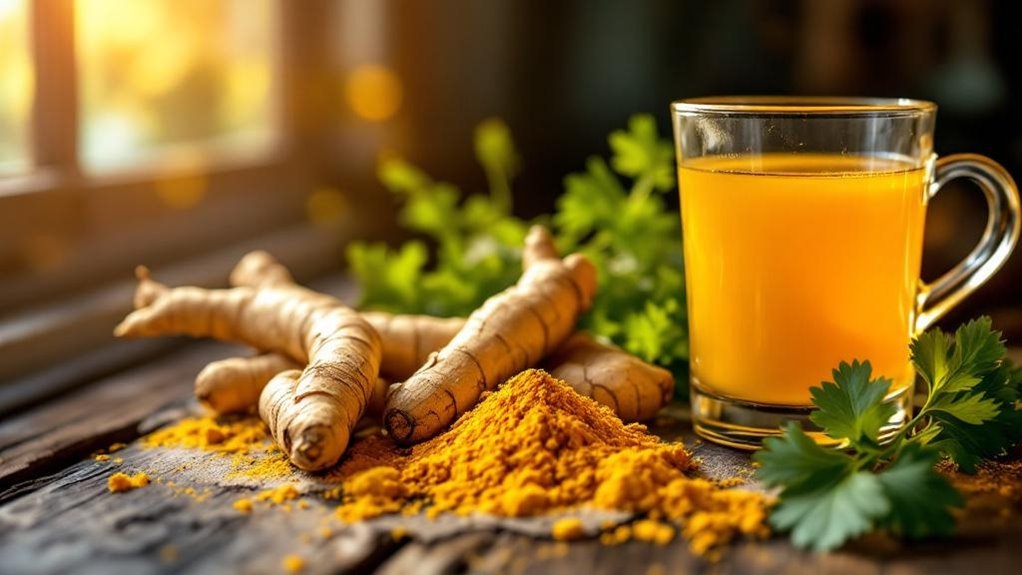Turmeric, with its key ingredient curcumin, has garnered attention for its potential benefits in promoting heart and brain health. Studies suggest it can reduce inflammation, lower blood pressure, and improve cholesterol levels. Beyond cardiovascular benefits, curcumin may also play a role in enhancing cognitive function and supporting mental well-being. The implications of these findings raise questions about how incorporating turmeric into daily routines could transform overall health. What might that look like for individuals seeking wellness?
Key Takeaways
- Curcumin in turmeric has significant anti-inflammatory properties, beneficial for heart health and reducing blood pressure.
- It can lower total cholesterol and “bad” LDL levels while increasing “good” HDL cholesterol.
- Curcumin may enhance cognitive function and mental well-being, potentially improving symptoms of anxiety and depression.
- There’s evidence suggesting curcumin boosts brain-derived neurotrophic factor (BDNF), supporting brain health.
- Incorporating turmeric into meals can be easy and enjoyable, promoting overall well-being and heart-brain health.
Health Benefits of Curcumin
While many people seek natural remedies for health issues, curcumin, the active compound in turmeric, has garnered attention for its potential benefits.
Research shows curcumin can lower C-reactive protein (CRP) and tumor necrosis factor-alpha (TNF-α), indicating its anti-inflammatory properties. Individuals with rheumatoid arthritis and polycystic ovary syndrome (PCOS) might experience significant relief.
Curcumin’s anti-inflammatory properties may offer significant relief for those with rheumatoid arthritis and polycystic ovary syndrome.
Additionally, curcumin’s effects on blood pressure and cholesterol are significant; systolic blood pressure can decrease by about 2 mmHg, while total cholesterol and “bad” LDL levels drop, and “good” HDL cholesterol rises.
These findings suggest curcumin could play an essential role in managing various health conditions.
Cognitive Function and Mental Health
Curcumin’s potential benefits extend beyond physical health, as research indicates it may positively impact cognitive function and mental well-being.
Studies show that curcumin can reduce symptoms of anxiety and depression and boost brain-derived neurotrophic factor (BDNF) levels, essential for brain health. Older adults taking curcumin reported enhanced cognitive function, though no significant improvements in depression were found in this group.
In Alzheimer’s patients, results were mixed, with some showing worse performance on cognitive tests. While curcumin holds promise for mental health, individual responses can vary, highlighting the need for further investigation into its effects on cognitive function.
Practical Applications and Recommendations
Incorporating turmeric into daily routines can be both simple and enjoyable. People can add turmeric to their meals, using it in cooking or baking, or opt for turmeric shots for a quick boost.
Incorporating turmeric into meals or enjoying quick turmeric shots makes adding this spice to your daily routine both simple and enjoyable.
Available in various forms like teas, smoothies, capsules, and gummies, there’s a format for everyone.
Monitoring individual health responses to turmeric is essential, and consulting healthcare professionals can provide tailored advice.
Those with specific health conditions, such as PCOS or diabetes, should be aware of how turmeric may affect their situation. This awareness enhances the potential benefits of turmeric for overall well-being.
FAQ
Can Turmeric Interact With Medications or Supplements?
Turmeric can interact with various medications and supplements. It may enhance or inhibit effects, particularly anticoagulants and antidiabetics. Consulting healthcare professionals before starting turmeric is essential for ensuring safety and preventing adverse reactions.
How Much Turmeric Should I Consume Daily for Benefits?
For daily benefits, experts recommend 500 to 2,000 mg of turmeric or curcumin. Individuals should monitor their body’s response and consult healthcare professionals to tailor the dosage according to their specific health needs.
Are There Specific Dietary Restrictions When Taking Turmeric?
Taking turmeric’s like walking a tightrope; balance is key. While there aren’t strict dietary restrictions, individuals should be cautious if they have gallbladder issues or are on blood thinners. Consulting a healthcare professional’s always wise.
Can Pregnant or Breastfeeding Women Use Turmeric Safely?
Pregnant or breastfeeding women should consult healthcare professionals before using turmeric. While generally safe in culinary amounts, high doses may pose risks. Individual responses vary, so professional guidance guarantees safety and tailored health advice.
What Is the Best Form of Turmeric for Maximum Absorption?
For maximum absorption, the best form of turmeric’s typically a standardized supplement paired with black pepper. This potent partnership promotes performance, enhancing curcumin’s bioavailability and ensuring users experience its remarkable health benefits effectively.
Conclusion
Incorporating turmeric into daily routines can be a simple yet powerful step toward enhancing heart and brain health. As curcumin works its magic, it not only supports cardiovascular wellness but also sharpens cognitive function, offering a natural remedy for mental well-being. Like a golden thread woven through the fabric of a balanced lifestyle, turmeric enriches overall health, making it an essential spice for those seeking to thrive in both body and mind.

